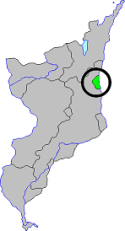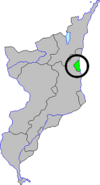Milwaukee (Minno-akking, Milwaukie)
|
|
|
| Motto: 𝔐𝔦𝔩𝔴𝔞𝔲𝔨𝔢𝔢: 𝔢𝔦𝔫 𝔏𝔦𝔠𝔥𝔱𝔟𝔩𝔦𝔠𝔨 (German: "A Bright Spot")
|
| Subdivision of:
|
Ouisconsin, North American League
|
| Languages:
|
|
| Official:
|
English, Ouisconsin Koine German, Ojibwe, Menominee, Slevan (honorary)
|
| Others:
|
Gaeilg, Venedic, Bodewadmi, Fox, Mascouten
|
| Mayor:
|
Johann Sarrazin-Koch
|
| Population:
|
1,574,734 Milwaukeeans
|
| Established:
|
1818 (as Ville de Juneau, 1835 (Council of Three Fires permission to incorporate), Articles of Incorporation
|
Chicago's "little brother," Milwaukee was also former Potawatomi territory, also changed by large numbers of Germans and Slevans. It was split off from Bodewadmi Fithing in 1862, somewhat later than Chicago, and more so than its larger neighbor, still has a distinctive Potawatomi character, with strong traces of German. A century ago, Milwaukee revolutionized American beermaking.
As a large metropolis not far from an even larger one, Milwaukee's relationship with Chicago has been complex and has shifted over the years. Traditionally Milwaukee has been a political, economic, and cultural counterweight to its southern neighbor. Many provincial elections have featured a slate of Milwaukee candidates running against a slate of Chicagoans. At other times, however, Chicago party bosses, business magnates, and cultural institutions have overshadowed and dominated Milwaukee life. Currently, Milwaukee is experiencing something of a renaissance, especially in the arts. Its citizens are rediscovering pride in their city and are newly defining what makes Milwaukee unique. Following the 2009 legislative election, both major provincial offices were occupied by Milwaukeeans. Brion Martens, a Whig, was Lord Governor from 2005 to 2010, while Tomos Bernardd, a Covenant Loyalist, became Speaker of the Council following the CL victory in the election.


